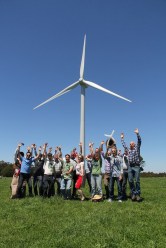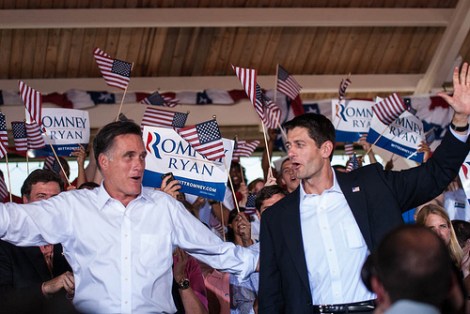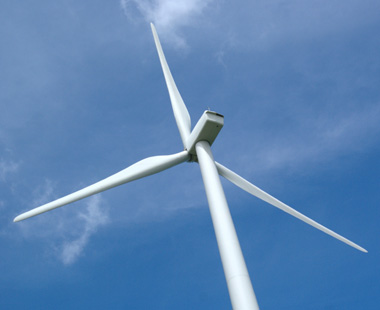The two presidential campaigns are now operating as weird reflections of each other. Each is criticizing the other for killing energy jobs; each is claiming to be an industry’s salvation. It’s basically the same strategy, but Romney says “coal” while Obama says “wind.”

Photo by Hepburn Wind.
This afternoon, Mitt Romney heads to Ohio, where he’ll attend a “coal event” in a small town near the West Virginia border. Romney’s goal is to leverage the “war on coal” rhetoric that’s dragging down the president’s popularity in the region.
As Cincinnati.com notes, the optics of Romney’s trip today may be tricky.
Romney will be at American Energy. A sister company within parent Murray Energy Corp. pleaded guilty last month for a pipeline rupture at a coal preparation plant near Beallsville that spilled thousands of gallons of slurry into pristine Captina Creek, turning the stream black for 22 miles. Ohio Valley Coal Co. pleaded guilty last month in federal district court to criminal violations of the federal Clean Water Act. The spill is costing the company millions.
Murray Energy is the largest privately held coal company in the nation, according to its website. An accident at its Century Mine in Beallsville on Aug. 8, 2011 killed a worker.
So why the visit? Why let Murray “[bus] in employees and their families for the rally in support of Romney”? Perhaps this CNN interview with Robert Murray, CEO of Murray Energy, explains.
Barack Obama and his Democrat followers are destroying entire segments of America. The whole country had better wake up to what’s going to happen to electric power costs. Ma’am, it has nothing to do with politics. In the Eastern Ohio where these jobs are limited, it doesn’t make any difference whether you’re a Democrat or Republican. Everybody there wants jobs and he’s destroying them.
Rational debate over coal, right there. Do we need to add that Murray is a Romney bundler who’s given tens of thousands to the Republican Party?

Romney and Ryan. (Photo by monkeyz_uncle.)
On the flip side of the coin is wind power. Romney’s running mate, Paul Ryan, will be in Lakewood, Colo., today, likely facing a hostile reaction from a state that has thousands of jobs in wind energy. Romney, you may remember, wants to end the production tax credit (PTC) for wind — and with it, thousands of wind jobs.
The president has been hammering Romney on the issue (for example, yesterday in Iowa), waging a battle over wind power in battleground states. Just this morning, the Department of Energy noted that wind employs 75,000 people nationwide and was responsible for 32 percent of new electricity generation last year. The PTC expiration puts that growth at risk — and hands the president a campaign issue.
Expiration of the PTC isn’t an imaginary threat to the wind industry. Vestas is already cutting jobs in Colorado due to a market softened by concerns over the PTC.
Vestas Wind Systems, the world’s largest wind turbine maker, said Monday a weakening market is forcing it to cut about 20 percent of the 450 jobs at its tower factory in Pueblo.
The soft market is a result of Congress not renewing the federal wind production tax credit, which is set to expire in December, Aarhus, Denmark-based Vestas said in a statement.
Pueblo is about a two-hour drive from Lakewood, so Ryan probably won’t swing by to apologize to the workers. With the White House’s declaration that the PTC is a “top priority,” it’s far more likely that the president would make time for Vestas on his next visit.
Two energy sectors, one political tactic. How it will play out is yet to be determined, but the president is in the enviable position of having the more rational argument: support a growing, clean industry instead of defending an evaporating industry.
If we’ve learned one thing from history, though, it’s that rational arguments are not always the ones that win on Election Day.




